Introducing Allergenic Foods: Ask Us Anything with Ron Sunog, MD and Katie Ferraro, MPH, RDN
In this episode Dr. Ron Sunog & I are answering listener questions about food allergies and babies.
Dr. Sunog and I have a brand new food allergy program called EAT THE 8: Preventing Food Allergy with Food and it’s all about how to SAFELY introduce your baby to the BIG 8 allergenic foods and use FOOD to prevent food allergy.
You can check out the full program here, but inside of this brand new program Dr. Sunog & I are showing you how to:
...Safely introduce your baby to each of the major allergenic foods early and often...no more using fake food powders because you’re scared of feeding real food!
...Recognize the signs of a true allergic reaction...and understand the other non-serious symptoms that aren’t worth worrying about
...Bypass expensive and gimmicky supplement and powder subscription programs designed to convince you that your baby can’t eat real food
...Make all of the program recipes that help you safely select, prepare and offer your baby all of the allergenic foods at each of the 3 infant feeding ages & stages (...even if you can’t cook!)
...Raise the kind of independent eater grandparents brag about…”My grandbaby eats shellfish...and LOVES every bite!”
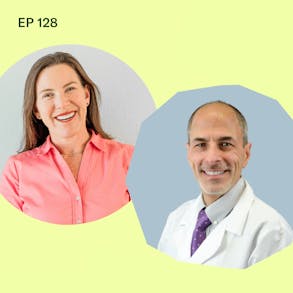
LISTEN TO THIS EPISODE
Episode Description
There are no dumb questions when it comes to food allergy awareness! In this episode my colleague pediatrician Ron Sunog, MD and I are answering YOUR questions about introducing allergenic foods to your baby.
What if the parent has a food allergy, will the baby inherit it? How much of an allergenic food do you introduce in order for it to “count”? What about feeding babies with peanut allergy peanut oil, how to handle reintroducing cow’s milk foods if baby had cow’s milk intolerance and lots more!
Dr. Sunog & I just launched our brand new food allergy program called EAT THE 8. It’s all about how to safely introduce your baby to the BIG 8 allergenic foods (+ sesame) and we’re also including a 4-week live Q&A component where program members can ask us any allergy related questions if you get stuck introducing these new foods to your baby.
You DON’T need to buy into expensive supplement powder programs to introduce allergenic foods. Babies can learn to eat allergenic foods & we can show you how. Check out EAT THE 8 program at www.foodallergyclass.com & come join us in this FOOD FIRST REVOLUTION!!!
About the Guest
- Dr. Ronald Sunog, MD is a pediatrician in Brockton, MA and has over 40 years of experience in the medical field.
- He graduated from Boston University in 1984.
- He is affiliated with medical facilities such as Tufts Medical Center and Boston Children's Hospital.
Links from this Episode
- Baby-Led Weaning with Katie Ferraro program with the 100 First Foods™ Daily Meal Plan, join here: https://babyledweaning.co/program
- Baby-Led Weaning for Beginners free online workshop with 100 First Foods™ list to all attendees, register here: https://babyledweaning.co/baby-led-weaning-for-beginners

Latest Episodes
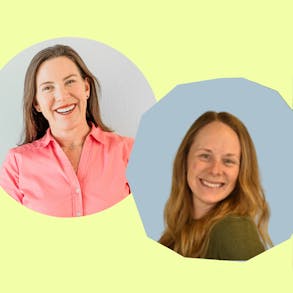
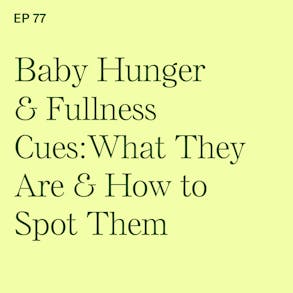
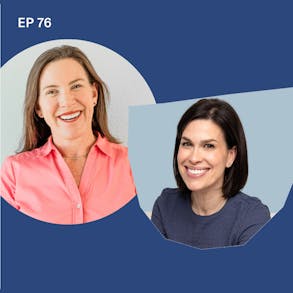
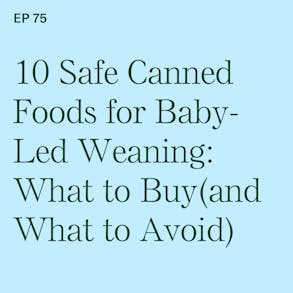
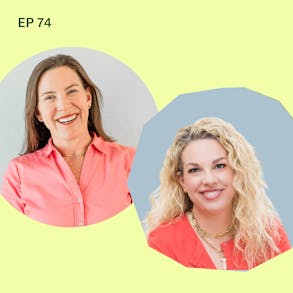
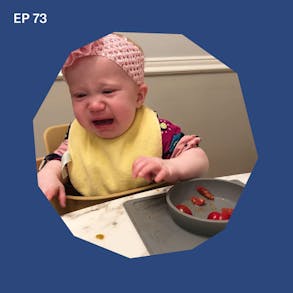
Dr. Ron Sunog (1s):
A family history of food allergy. And to expand that a bit further, a family history of the atopic diseases increases the risk of the family members will have the atopic diseases, but it doesn't mean that they will have food allergies.
Katie Ferraro (15s):
Hey, there I'm Katie Ferraro, Registered Dietitian college nutrition of professor and mama seven specializing in baby-led weaning. Here on the baby Led Weaning Made Easy podcast, I help you strip out all of the noise and nonsense about feeding, leading you with the competence and knowledge you need to give your baby a safe start to solid foods using baby Led Weaning. Hey guys, welcome back. Today, I'm being joined on the podcast by Dr. Ron Sunog who some of you are probably getting to know pretty well by now. Dr. Sunog is a pediatrician with a special interest in helping parents use food to prevent food allergies with their babies and Dr.
Katie Ferraro (59s):
Sunog and I have a brand new digital program. We just launched together. It's called EAT THE 8. And it's all about how to get your baby to eat the big eight allergenic foods plus sesame. Because those are the nine foods that account for about 90% of food allergy. And the research shows us that early introduction of these allergenic foods early and often may help prevent food allergy. But parents are starting to think that they can't do this. They're getting pressured into buying these gimmicky expensive supplements and power mixing programs intended to introduce allergenic foods. But Dr. Sunog and I were food. First advocates. We want to see you guys using food to prevent food allergy, because if you look at the research that links food allergy prevention to early introduction of foods, it's done with food and not on babies who are taking supplements and babies who are six months of age plus showing any other signs of readiness to feed can certainly eat the big eight allergenic foods safely.
Katie Ferraro (1m 53s):
So in today's episode, Dr. Sunog and I are going to be answering your questions about food allergy. There are some great ones that you guys sent in. Thank you so much for that. If you liked this Q and A style, Dr. Sunog and I also have a live component to our eat, the eight program where we answer your individual questions each week inside of our private group settings. So if you want to check out the EAT THE 8 course, it has all of the information on how to safely select, prepare and offer your baby those big eight allergenic foods, plus sesame. And there's tons of recipes in there to, for the different ages and stages of feeding. So no matter where you are, you can push your baby's palate and do these allergenic foods with food, check it out at foodallergyclass.com enrollment in the program.
Katie Ferraro (2m 36s):
It's only open for a short period of time. We're actually going to be shutting the doors down soon in order to turn our attention to the great group of parents and caregivers who are already on board with using food to prevent food allergy. So again, go to foodallergyclass.com to check out the, EAT THE 8 program, and with no further ado, I want to introduce Dr. Sunog who, along with myself, we're going to be answering a few of your burning food allergy questions.
Guest (3m 3s):
I have a lot of food allergies. Does that mean my baby will inherit those food allergies or will she be predisposed to them?
Dr. Ron Sunog (3m 10s):
So definitely predisposed a family history of food allergy. And to expand that a bit further, a family history of the atopic diseases increases the risk of their family members will have the atopic diseases. Again, that's a atopic, eczema, food allergy, rhinitis, runny nose and asthma, but it doesn't mean that they will have food allergies just means increased risk.
Guest (3m 35s):
Hi Katie and my daughter is eight and a half months old. She's allergic to nuts and eggs, and we have been told by the doctor to stop giving her any allergic food for now and just made for six months. And then we can try to give her like baked products. So I was just wondering how soon we can start with the egg ladder or how soon we can overcome this allergy. Thank you.
Dr. Ron Sunog (4m 0s):
Okay. So there's sort of two questions there. You have to stay away from the foods that, you know, she's allergic to. Stay away from the eggs, stay away from the peanut. As far as other foods don't stay away at all for any amount of time, you may feed them now. As far as an egg ladder, that's more complicated that should be done with the guidance of an allergist. So I can't answer that specifically, but the other foods feed them now.
Guest (4m 26s):
Hi, my little guy is six months old, so we're just about to start solids. And he has a severe allergy to whey, but it's on his skin to the point where like my husband and I were having protein shakes, giving him a kiss and he was breaking out all over his face with red hives. So I'm kind of concerned about introducing milk. Just wondering about the best way to go about that. Thanks
Dr. Ron Sunog (4m 51s):
So, if these are hives and if you're sure of that, then this is very likely cow's milk allergy. And so there's no way to go about this. You want to stay away from cows milk if you're not positive with the rashes or you just want confirmation, get a picture of that rash. If you can talk,, to your pediatrician or allergist, get testing for cow's milk, but it sure sounds like it is cow's milk allergy. You stay away. There's no re-introducing except maybe down the line. Some number of years later, possibly testing, possibly and oral food challenge.
Katie Ferraro (5m 24s):
Can you talk a little bit about testing when you say get testing? What does that entail?
Dr. Ron Sunog (5m 28s):
So there to common kinds of tests and blood tests and the skin prick test, what they're looking for is evidence that the individual is being tested, that their immune system is sensitized to the food, but sensitization does not equal allergy. It's only a piece of evidence that in the context of a total picture, meaning a good history results in a diagnosis of allergy to the food. So those are the two common kinds of tests. The important thing, many infants, children, people grownups will test positive to foods. They are absolutely not allergic to. So out of context, these tests are not worth very much.
Dr. Ron Sunog (6m 9s):
Don't do them out of context.
Guest (6m 11s):
Hi, my daughter is seven months old and already three weeks into BLW. Recently we have discovered she has atopic eczema and my pediatrician suspects, common patina allergy. Hence I've been told to stop all these and send exclusively breastfeeding in India. They don't encourage BLW. So I'm wondering how to introduce the eight allergens to her since I'm all to not consuming any dairy, it will be great if you reply. Thank you.
Dr. Ron Sunog (6m 39s):
So we need some more information here, so I can speak a little more in generalizations. The chance that a rash that is eczema is caused by a food is very, very low. The chance that it's a topic eczema, which is, you know, eczema, that the baby already has a part from any food reaction that is made worse by eating certain foods is not at all low. So it could very well be that cow's milk allergy exacerbates your baby's eczema simply makes it worse. What's the response to that? Treat the eczema as vigorously as you can get that skin as healthy as you can in continue to feed milk now, because I don't have some details here.
Dr. Ron Sunog (7m 19s):
I can't tell you to absolutely give milk. Maybe your baby needs a test for milk, but you really need that rash seen and diagnosed, you know, very accurately.
Guest (7m 30s):
After a recommendation from our pediatrician, we tried Introducing greek yogurt to our nine month old and he had an immediate reaction to it. He ended up getting a face rash, a welt on his face, and he was vomiting for about six hours after having some other foods and some formula. So we haven't given him any dairy since then. And we're just not sure if we should go ahead and try introducing dairy again, or if we just rolled dairy out for him. He has been on a hypoallergenic formula since one month old. So he's definitely got some sort of a milk protein issue, but we're not really sure how to proceed with dairy
Dr. Ron Sunog (8m 16s):
Based on the description of the reaction. That certainly sounds like cow's milk allergy. The simple answer is you do not proceed with dairy, stay away from it. I'm curious about what the reaction was at one month of age, I've led to the hypoallergenic formula. And I don't know if at that point it was allergy or just milk protein intolerance of some sort. But at this point, that reaction sounds like allergy. I certainly recommend testing specifically for milk. And as far as the other foods go ahead and feed them.
Guest (8m 45s):
Hi Dr. Sunog and Katie. I'm a father that has seven month old and I'm allergic to peanuts. I'm scared that he might be too. I was just wondering if I want to introduce him to peanuts. Could I use peanut butter if it does not have a really good idea, any would help? I just want to make sure that I'm safe. Thanks
Dr. Ron Sunog (8m 59s):
So because of your peanut allergy, your child certainly has a slightly higher than baseline risk of developing peanut allergy, but it is so slightly higher that you don't have to stay away from peanut. And in fact, you wanted to introduce peanut early to reduce his risk of developing peanut allergy. How do you do that? You can do that. And any of the ways that are, you know, non choking, safe for infants. Meaning water down, peanut butter, peanut flour, and peanut puffs. And of course, remember yourself, keep yourself safe. Don't get an allergic reaction and peanut while you're, you know, helping your infant out.
Katie Ferraro (9m 37s):
Exactly. If there's someone else that can help you, you know, peanut butter can be made safe, but we always want to make sure we're choosing smooth, not crunchy peanut butter. Always look for unsalted and also make sure it doesn't have any sugar in it. There are some safer ways to do it. We definitely don't do thick globs and peanut butter for early eaters. And you mentioned peanut flour. I get a lot of parents. We asking questions about these different peanut powders. Some of the brands that are out there are really marketed as diet foods for adults. So they've, defatted peanut powder. One of the best things about peanut butter is that it's a great source of fat for babies once they get pretty decent at swallowing it. But when you take all the fat out of it becomes very, very dry that equates to moisture and moisture helps to reduce choking risks. While we don't do the sticky globs of nut butter early on the peanut powder, sometimes the protein powders that are out there as they're marketed, they either have added sugar in them.
Katie Ferraro (10m 24s):
And we don't give anything to babies with added sugar. And until after two years of age or they'll have artificial sweeteners in it, sometimes they add these artificial sweeteners or they'll have sugar alcohols will even in small quantities which can be quite difficult on a baby's gut. So I would just encourage you not to mess around with any of those fake foods and go for real foods like peanut butter, if it's thinned out and made safe or peanut butter puffs, or if you're baking something that has no sugar and very minimal amounts of salt than using peanut flour, but stay away from some of those diet products that are marketed to parents.
Guest (10m 52s):
Hi, my name is Amber and my daughter is 11 months old. And my question is specifically about peanut oil. And if a child has reaction to peanut butter, will they also likely have a reaction to foods that have peanut oil in them or foods that have been fried in peanut oil? Thanks.
Dr. Ron Sunog (11m 13s):
Yeah, so the difficult word, and there's likely if it's certainly possible. So if the oil is extremely well-refined and has no peanut protein in it, it should be safe, but I think that's a difficult thing to depend upon. So I would stay away from anything cooked in peanut oil.
Katie Ferraro (11m 32s):
And you have to also look at how that peanut oil was actually processed and prepared. You always should check with your pediatric provider. If there is a peanut allergy, there are certain types of peanut oil that can be tolerated. Then there's other ones, some of the cold pressed ones or the extruded ones will sometimes refer to as these gourmet oils, they may not be safe for babies. So you do just want to read your labels.
Guest (11m 53s):
Hi Katie. When offering a potentially allergenic food to a baby for the first time, how much should you offer them? Like one serving sized, a couple tablespoons. Just curious about how much you should offer them?
Katie Ferraro (12m 5s):
Great question Lauren. I know it can be confusing. You hear those recommendations to introduce these foods early and often and parents, like, what does that mean? Dr. Sunog always reminds us that this information, it is kind of a gray area. It's also like, it's pretty confusing for parents, but the answer is we really don't know how much. So anytime you see something that says you need two ounces of a lagume or a three-quarters of a cup of this, it's all arbitrary and made up. We don't know exactly what constitutes a serving size. Dr. Sunog and maybe you could speak about the leap trial and what the serving size is that they use for their cause. Parents. We don't have to ask if they should do that as well.
Dr. Ron Sunog (12m 40s):
Yeah, so in the leap trial, infants were fed two grams of peanut food to grams of the protein component three times a week, because that's what we studied. That's used as kind of a benchmark, but it's not a definite known standard that absolutely has to be followed. And we certainly can't say that about the other allergenic foods. The other thing I would add is if you're talking about, you know, the first time you try it, do you have to use a tiny amount? I would put it this way. You don't have to do that, but if it makes you feel safer that you're just going to give a tiny dab or bit of whatever the allergenic food you're trying is. Sure. Do a very small amount, wait 10 minutes, see if there's reaction and go from there.
Dr. Ron Sunog (13m 24s):
You don't have to do that, but what's the harm if it makes you more comfortable.
Katie Ferraro (13m 28s):
And is there a dose dependent response going on with the size of the portion that you would introduce, if your baby is going to be allergic, are they going to have a bigger reaction if you introduce more of this food?
Dr. Ron Sunog (13m 38s):
The simple answer is no. There is certainly the potential for having a response or not having response to food allergy reaction based on how much an infant eats, but it doesn't, you know, once the reaction is happening, it's going to be whatever is going to be. And if it won't matter how much of the food you've given.
Guest (13m 58s):
So my baby is allergic to milk protein or dairy. He's currently six months right now, once we start, we have started to eat solids. How do we introduce dairy back into his diet? And can we slowly reintroduce any frozen milk that most pumped during a time when I was still eating dairy?
Dr. Ron Sunog (14m 18s):
So you have to really be clear on here is, is your baby really allergic? If they're really allergic, that means if they've had an actual food allergy reaction, meaning hives or any of the other real allergic reactions and not some skin irritation, for whatever reason. Then you are not going to reintroduce dairy and, you know, did they get tested? Did you discuss this with a pediatric provider or allergist to be sure that you're really dealing with a milk allergy? If you are, you're not reintroducing that you're staying away, probably you have an epipen or need one, and you can introduce all the other foods. That would be fine. If you are not talking about a real food allergy reaction, then you don't have to stay away at all.
Dr. Ron Sunog (15m 1s):
So the real key here is what was the actual specific reaction.
Katie Ferraro (15m 5s):
Well I hope you guys enjoyed that episode with some Q and A about food allergies. I don't know about you, but I could listen to Dr. Sunog answer food allergy questions all day long. Actually I do get to do that a lot. We've been working on our brand new digital program called EAT THE 8 for just about a year. At this point, we've done a ton of food, allergy Q and a in the past. And whenever I have Dr. Sunog on the podcast to answer your questions about food allergy, I always get so many great responses and messages from you. I personally just love his food first approach, because I know that not a lot of our pediatricians are as always up to speed as they should be. I mean, there's a lot to do when you're a pediatrician granted, and you know, more than 90% of physicians in this country, I've never taken a dedicated nutrition class.
Katie Ferraro (15m 47s):
So a lot of times the feeding advice that they're giving might not only be outdated, it could also be dead-wrong based on new research. So it's nice to have Dr. Sunog as a resource because this whole using food to prevent food allergy stuff is all he does. So if you do like that Q and A style with me and Dr. Sunog our new program eat, the eight has a live component where we answer individual questions each week inside of the group setting. If you want to check out our program called EAT THE 8 it's has all of the information on how to safely select and prepare and offer your baby the big eight allergenic foods, plus Sesame, along with a ton of video instruction, research overview, and lots of recipes for each of the different ages and stages of feeding. So even if you feel like you're getting a late start to switching from purees, maybe, or starting solid foods, or you started, but you haven't done these allergenic foods, the guide for you on how to get your baby up to speed with food's to prevent food allergies is all inside the EAT THE 8 program.
Katie Ferraro (16m 40s):
So to go to food allergy class.com, if you want to check it out, enrollment is only open for just a short period of time, more going to be shutting down the doors soon in order to turn our attention to this amazing group of parents and caregivers we have already signed up to start using food to prevent food allergy. So you guys think you could still use additional info on how to safely feed your baby these allergenic foods. Come check out our EAT THE 8 program at foodallergyclass.com. Thanks for listening. See you next time.

The Program Baby-Led Weaning with Katie Ferraro
A step-by-step digital program for starting solid foods safely and navigating the original 100 FIRST FOODS™ meal plan with baby-led weaning.
 EXPERT-LED, PROVEN APPROACH TO EATING REAL FOOD
EXPERT-LED, PROVEN APPROACH TO EATING REAL FOOD CONCISE VIDEO TRAININGS TO MASTER BABY-LED WEANING
CONCISE VIDEO TRAININGS TO MASTER BABY-LED WEANING 100 FIRST FOODS DAILY MEAL PLAN WITH FOOD PREP VIDEOS
100 FIRST FOODS DAILY MEAL PLAN WITH FOOD PREP VIDEOS
Baby-Led Weaning for Beginners Free Workshop
Is your baby ready to start solid foods, but you’re not sure where to start? Get ready to give your baby a solid foundation to a lifetime of loving real food…even if you’re feeling overwhelmed or confused about this next stage of infant feeding.
Get baby-led weaning recipes and tips delivered to your email inbox.

